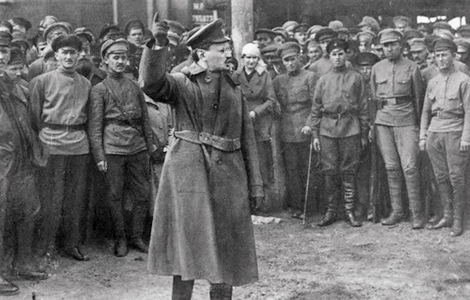Speaking to Tens of Thousands Before Battle: Is it Possible? October 27, 2014
Author: Beach Combing | in : Ancient, Medieval , trackbackBeach worried to day about speeches before battle in ancient and medieval times. If you have read any Roman or Greek historian then you know the drill. General stands up before his army, makes a few choice reflections on why his men are fighting, and then the army goes out, inspired, and trashes or is trashed. Classicists have had, however, little patience with the speeches recorded in the histories, pointing out that they are part of rhetorical culture and have nothing do with realities: for example, no Roman heard the speech that Boudicca gave to her warriors, though Tactius and Cassius Dio apparently give us exact (and different) copies of her words, as if there was a scribe behind her chariot. But forget this complaint and consider a more practical one. How could an army have ever hoped to even hear their general give simple instructions like ‘don’t slip in the mud’, ‘watch out for the Immortals’, ‘be good’ given the numbers involved? Never mind listen to the five or six minute rant that this or that leader would be expected to give…
Well, let’s say you are in charge of a Roman legion going out to maul the Picts or some other deserving barbarian race in or beyond the limes, what chance would your men have of hearing you before you went into battle? This came as a surprise to this blogger, but the chances are actually quite good. A Roman Legion, after all, was 5,400 men, let’s say 6,000 to include a couple of federate units, trying to keep up, on the flanks. If you are a general waiting on the plain to go and annhilate an enemy stronghold, you would get on top of a white steed in front of your legionaries. The men are ranged up and ready to go: their adrenalin is bubbling. They will not be chatting about the weather but concentrating on instructions and survival. There may be some ironic comments as you speak, but there will also be the willingness and the conditions to listen. 6,000 people is equal to many small soccer stadiums and though the conditions are not quite as ideal as they would be, in acoustic terms, for someone who stands in the centre of a soccer pitch and yells, a few simple ideas could be got across by anyone who could shout them for long enough. An exceptional voice might really make a difference and we have to remember, again, that generals could depend on silence: in that sense the comparison with a stadium is an unhappy one.
Don’t doubt that this is possible under the right conditions. George Whitefield the preacher (obit 1770) sometimes preached to 25,000 or 30,000: Savonarola in late fifteenth century Florence spoke for hours to ten to twenty thousand people. (Perhaps the straining to hear actually added to the enthusiasm and the silence of their publics). These men had fine speaking voices. But most adults could get across a basic message like ‘kill the savages’, or ‘win this in good order and I’ll increase your salt rations’ if they had the crest of a general on their head and, hence, their army’s attention. In the Middle Ages most armies could have been shouted at by a monarch because armies, even on occasions when a nation’s destiny was decided, rarely tipped much over ten thousand. In antiquity there were, though, occasions when armies got just too big. Probably not even Alexander the Great could have spoken to his 50,000 men: there were perhaps between 80,000 and 100,000 in the Roman army at Cannae… In these circumstances the general would presumably either take turns to speak to his warriors in blocks or perhaps send out simple uniform messages to units. This is the system we find in place when our sources become good enough to trace the mechanics of battle preparation in early modern and modern times: ‘With our backs to the wall…’, ‘England expects…’, ‘Ireland calls through her dead children…’ The kind of thing that could easily have been transmitted inspiringly by uninsipring men with moustaches. Other thoughts on speaking to the masses: drbeachcombing AT yahoo DOT com And when was the last speech to a huge army? The likes of Napoleon would have found it deeply uncool to even try…
31 Oct 2014: Mike Dash makes an important point, could you strategically have gotten away with a chat with the troops: What you say is no doubt correct in purely technical terms, but surely overlooks the requirement to have one’s army drawn up in some sort of battle formation. (To pursue your analogy, legionaries in the centre, cavalry on the flanks, wild and disposable celtic auxiliaries somewhere out in front in a skirmishing line… ) In those circumstances, gathering the whole army around a leader in a loose circular scrum would surely be to invite immediate attack and catastrophic defeat by one’s less rhetorically-polished foes. So if there was any speech-making to be done, I suspect it must have been done well before the fighting actually took place. Then there is, of course, the question of how much of any such speech, delivered in even ideal circumstances, would have been communicated by an unfortunate series of Chinese whispers. “Blessed are the cheese-makers.”



